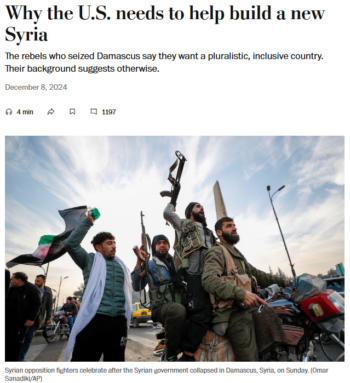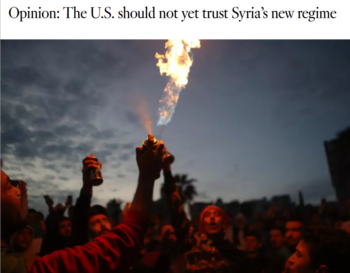Since the overthrow of the Syrian government, corporate media analysts have offered advice as to how the US should approach Syria going forward. These observers consistently opted not to call on the US and Israel to end their occupations of and violence toward Syria.

The Washington Post (12/8/24) calls for “engaged diplomacy” from the incoming Trump administration to “help write a brighter next chapter for this strategically located, and long-suffering, country.”
A Washington Post editorial (12/8/24), headlined “Why the US Needs to Help Build a New Syria,” said:
Syria might seem far removed from US interests. Before Mr. Assad’s fall, President-elect Donald Trump posted: “DO NOT GET INVOLVED!” But America is involved. Some 900 US troops and an undisclosed number of military contractors are operating in northeastern Syria near Iraq, battling the Islamic State and backing Kurdish forces fighting the Assad regime.
Estimates suggest that the US-led coalition that bombed Syria, ostensibly to defeat ISIS (Jacobin, 3/29/16), has killed at least 3,000 Syrian civilians and possibly more than 15,000. The Post misses a rather obvious point: The US can “help” Syria by withdrawing the forces that have slaughtered thousands of Syrian noncombatants.
The Post also published a piece by columnist Josh Rogin (12/8/24), “For the First Time in Decades, Syria Is Free. Now It’s Time to Help.” Set aside that Syria is not “free”; it is under foreign occupation (CBC, 12/10/24). The article provided virtually no details about the forms he thinks that “help” should take. Rogin said that “for those in Washington who have long wanted to withdraw US troops from Syria, [the ouster of Bashar al-Assad’s government] might offer a path forward.”
That falls short of saying that the US should withdraw its 900 troops and unknown number of contractors from the country, and Rogin said nothing about the US military bases in Syria, of which there are at least five, plus a minimum of two smaller sites (Stars and Stripes, 12/6/24). Through such mechanisms, the US has long exercised control over a quarter of Syrian territory, including its breadbasket and oil reserves (FAIR.org, 3/7/18; Responsible Statecraft, 7/28/24). Surely ending the US military occupation and returning sovereign control over the country’s vital resources are essential ways to “help” Syria, yet Rogin declined to call for these steps.
‘Promote stability and democracy’

Boston Globe (12/12/24): “A US military presence, however small, can make a difference.“
The Boston Globe’s editorial board (12/12/24) said that the fall of the Syrian government
represents an opportunity for the United States and the international community to reach out, to engage, and to help free Syria from the more cynical ambitions of Assad’s patrons in Iran and Russia.
Yet the paper endorsed the US occupation of Syria, writing that “a US military presence, however small, can make a difference.” It also advocated continued US meddling in Syrian affairs, asserting that “American diplomats can help promote stability and democracy in the country while sidelining extremist groups.”
Writing such a thing requires extraordinary cynicism, a goldfish’s memory, or both. The US teamed up with Al Qaeda in an effort to bring down the Assad government (Harper’s, 1/16). Weapons that America and its Saudi allies supplied to groups fighting the Syrian government “fell into” ISIS’ hands, significantly improving the quality of ISIS’ armaments, in quantities “far beyond those that would have been available through battle capture alone” (Al Jazeera, 12/14/17).
‘Cautious about removing sanctions’

“The US should be cautious about removing sanctions,” advised the LA Times (12/13/24).
In the Los Angeles Times (12/13/24), Matthew Levitt said Syria’s “people need and deserve American support now.” His definition of “support” includes the US “maintain[ing] its small but influential US military presence in Syria,” in part to enable America’s junior partners in northeast Syria, the Syrian Democratic Forces (SDF), to “continue maintaining detention camps holding Islamic State fighters.”
The conditions in these camps are abhorrent. An April report from Amnesty International concluded that the SDF and its local partners
—with the support of the US government and other members of the coalition to defeat the Islamic State (IS) armed group—are engaged in the large-scale and systematic violation of the rights of more than 56,000 men, women and children in their custody. Most of these people were detained during the final battles with IS in 2019. They are now held in at least 27 detention facilities and two detention camps and face arbitrary and indefinite detention, enforced disappearance, grossly inhumane conditions, and other serious violations. Many of those detained are victims of IS atrocity crimes or trafficking in persons.
Keeping Syrians in dungeons is a rather odd way to “support” them.
Levitt also wrote that “the US should be cautious about removing sanctions against the Syrian state.” Maintaining sanctions is the opposite of “support[ing]” Syrians. In July, the United Nations Economic and Social Commission for Western Asia reported that the sanctions are negatively “impact[ing] large sectors of the population and the economy, including basic services (education, health, [water, sanitation, and hygiene]) and productive sectors (manufacturing and agriculture), as well as the work of humanitarian organizations.”
The cruelty of the sanctions is such that during the war in Syria, according to World Health Organization (WHO) officials, Western sanctions have “severely restrict[ed] pharmaceutical imports,” undermining pediatric cancer treatment (Reuters, 3/15/17). Yet Levitt thinks the US shouldn’t hurry to lift such measures, even as doing so is a straightforward way to “support” Syrians.
Meanwhile, neither the editorial board of the Post nor that of the Globe includes sanctions removal on its list of ways to “help” Syria.
Furthermore, Levitt points out that, between the Assad government’s last hours and the first days after its overthrow, “the Israeli air force and navy have hit more than 350 strategic targets across the country, destroying an estimated 70% of Syria’s military capabilities.” Whatever Levitt’s definition is for “support,” it apparently includes the US allowing its Israeli surrogate to destroy Syria’s capacity to defend itself from foreign aggression. That won’t help Syria regain the sovereignty it has lost in the 13 years of international proxy war that have taken place on its soil, particularly when the party destroying Syrian military capacity is Israel, which maintains a decades-long regime of illegal occupation, colonization and annexation in Syria’s Golan Heights.
‘Suck Israel into Syria’

Thomas Friedman (New York Times, 12/13/24): “Middle Eastern countries…come in just two varieties: countries that implode and countries that explode.”
Similarly, the New York Times’ Thomas Friedman (12/13/24) argued that the incoming Trump administration should “help with—dare I say it—nation-building in Syria.” He went on to say “it would cost the United States and its allies little money and few troops to try to help” Syria. Friedman subsequently claimed that “without American help and leadership,” Syria could devolve into a “forever war” that would “suck Israel into Syria.”
Prior to Friedman’s article going to print, Israel had carried out 420 airstrikes in Syria in a week, hitting targets in 13 Syrian provinces. Israel had also set up shop on Mount Hermon, which is strategically located on the Syria/Lebanon border, in violation of 1974 disengagement agreement between Israel and Syria (BBC, 12/13/24).
Setting aside that Friedman bizarrely cast Israeli involvement in Syria as a hypothetical rather than a long-running reality—Israel bombed Syria hundreds of times in the 13 years of war that led to the Syrian government’s demise—the author’s notion of America “help[ing]” with “nation-building” does not exclude its underwriting Israel’s nation-destroying and nation-stealing in Syria.
In the same vein, the Globe’s editorial board says they want the US to “help free Syria,” but the Israeli violence that the US underwrites appears exempt, since it blandly describes some of what Israel has been doing, but doesn’t say it should stop:
Israel continues to launch bombing raids of Assad’s chemical weapons plants, naval vessels and Russian-made bombers, which the Israeli government says it is doing to prevent those military assets from falling into the wrong hands amid the chaos.
Thus, the authors seem to think the US can “help free Syria” without compelling its Israeli client to ends its relentless assault on the state. Meanwhile, stopping Israel’s bombing and conquest of Syria is not enumerated among the ways that Rogin or the Post’s editors think the US can “help” Syria have a brighter future.
If these commentators genuinely wanted Syria to flourish, they’d insist that the US and its allies finally end their long campaign of intervening in Syria, with quite harmful effects on the country’s population (Electronic Intifada, 3/16/17), and allow the nation to chart its own course.
This post was originally published on FAIR.